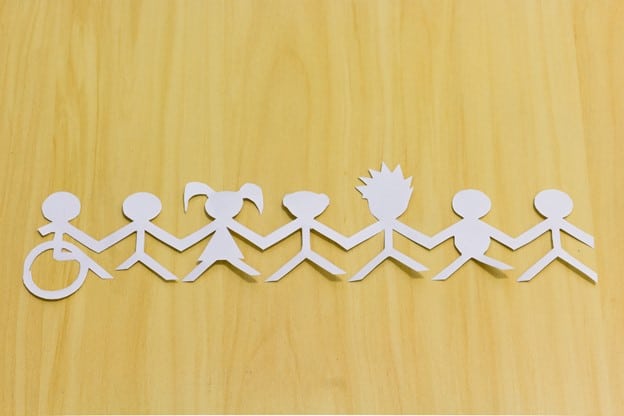Did you know that approximately 15% of the Earth’s population lives with a form of disability? That’s a lot of people—over one billion—and they’re known as the “world’s largest minority.” This group includes people of all races, ages, abilities, and socioeconomic levels, and together they represent the amazing and varied diversity of human life.
Too frequently, though, the condition of their bodies or mind forces them to lead lives of exclusion and stigmatization that shapes their experience in negative ways.
In the past three decades, a movement to celebrate disability culture and rights has grown in the United States and beyond, and a feeling of pride has gained traction. This is Disability Pride, and it is a powerful force that reminds the world that all people are unique and beautiful, no matter what they are capable of doing.
Regardless of who you are, isn’t it about time you got some Disability Pride?
Disability Pride History
In 1990, the Americans with Disabilities Act (ADA) was passed into law, which ended legal discrimination against people with disabilities in these areas of public life:
- Employment
- Transportation
- Public accommodations
- Access to state and local government services.
Prior to this act, it was common for employers to lead job interviews by asking applicants if they had any mental or physical impairments, which they could then use to exclude them from the workplace. Public buildings and transportation services had no obligation to provide assisted access or make accommodations for individuals with mobility issues.
In short, being a member of the one billion people with a disability was a constant struggle for validation and employment in a world that did not seem to care.
The passing of the ADA made an enormous difference in people’s lives, and in that same year, 1990, Boston held its first Disability Pride Day.
Why is Disability Pride Important?
Though the ADA helped make huge strides in the fight for equality for all Americans, members of the world’s largest minority still face tremendous struggles in day-to-day life. The stigmatization that disabled people face is real and directly impacts the quality of their lives.
Compared to the non-disabled population, disabled people still struggle to find the same happiness that others take for granted. Consider these challenges they face:
- Higher rates of poverty: Twenty-five percent of disabled Americans live below the poverty line, double the rate of non-disabled Americans.
- Lower levels of education: Children with disabilities have always suffered neglect and exclusion in the education system, and the fortunate percentage that experience school often do so in isolation from their “mainstreamed” peers. Additionally, instances of bullying and violence make school an unpleasant experience that many soon wish to leave behind.
- Higher incidents of violence: It is a shocking truth that children with disabilities are almost four times more likely than their non-disabled counterparts to be the victim of violence.
Ways to Celebrate Disability Pride
Now that you are informed about Disability Pride, here are some small acts of kindness and acceptance you can make in order to share awareness and support.
- Educate yourself on the challenges that people with disabilities face.
- Amplify the voices of the disabled.
- Read books by and about disabled people.
- Attend a Disability Pride Parade or celebration in your city.
Celebrate Disability Pride yourself! Share your acceptance of this group with your community, your family, your school, and anyone else who needs to hear the message.
Contact Us
At Advanced Behavioral Health, we are well aware of the challenges facing members of the world’s largest majority, and our trained healthcare professionals understand the extra physical and emotional burden they face in seeking mental health care.
If you or someone you love is struggling with mental health needs, please reach out to our team of qualified mental health specialists. You can call us at 301-345-1022 or send us a message online here. One of our team members will be standing by to help you find the confidential consultation you need.

